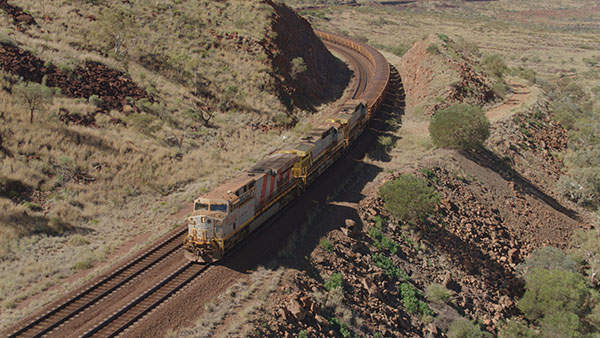Rio Tinto has completed the first delivery of iron ore using an autonomous train which transported about 28,000 tonnes of the ore from its Tom Price mining operations to Cape Lambert in Western Australia.

Image: A Rio Tinto autonomous train. Photo: courtesy of Rio Tinto.
The autonomous train is part of the mining giant’s $940m AutoHaul program, focused on transporting iron ore to its port facilities in the Pilbara region.
Comprising three locomotives, the Rio Tinto autonomous train made a journey of more than 280km, which was remotely monitored by the company’s operators from the Operations Centre in Perth, located more than 1,500km away.
The first iron ore delivery using an autonomous train comes less than two months after the miner had secured approval from the National Rail Safety Regulator for operating the robotic locomotives in Western Australia.
The AutoHaul is on track to be completed by the year end, said Rio Tinto. The company believes that the project would unleash significant safety and productivity gains for the business, as well as help in streamlining its iron ore system by giving more flexibility and minimizing bottlenecks.
Rio Tinto rail, port & core services iron ore managing director Ivan Vella said: “The safe first delivery of iron ore by an autonomous train is a key milestone for AutoHaul. The programme will deliver the world’s first fully autonomous, long-distance, heavy-haul rail network, operating the world’s largest and longest robots.
“This programme symbolises both the pioneering spirit and innovative talents of many people across Rio Tinto and shows our absolute commitment to improving safety and productivity, as well as enabling greater flexibility across our operations.”
Rio Tinto’s conventional rail operations comprise about 200 locomotives, which are operated on more than 1,700km of track in the Pilbara region, to transport ore from 16 mines to four port terminals.
The company said that the average return distance of its newly launched autonomous trains is around 800km with an average journey cycle taking nearly 40 hours.
It revealed that the trains are equipped with AutoHaul software and on-board cameras to enable constant monitoring from the Operations Centre while all public rail crossings on the rail network have CCTV cameras for safety purpose.
